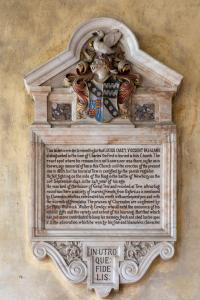First Battle of Newbury
First Battle of Newbury is in 1640-1649 Civil War and Regicide.
On 20 Sep 1643 the First Battle of Newbury was fought at Newbury [Map] with King Charles I of England, Scotland and Ireland (age 42) commanding the Royalist army and Robert Devereux 3rd Earl Essex (age 52) commanding the victorious Parliamentary army. For King Charles I of England, Scotland and Ireland (age 42) John Byron 1st Baron Byron (age 44) fought with distinction.


Henry Bertie was killed.
Robert Dormer 1st Earl Carnarvon (age 33) was killed. His son Charles Dormer 2nd Earl Carnarvon (age 10) succeeded 2nd Earl Carnarvon, 3rd Baron Dormer of Wyng in Buckinghamshire, 3rd Baronet Dormer of Wyng in Buckinghamshire.
William Villiers 2nd Viscount Grandison (age 29) was killed. His brother John Villiers 3rd Viscount Grandison succeeded 3rd Viscount Grandison.
Edward Villiers (age 23) fought.
Lucius Carey 2nd Viscount Falkland (age 33) was killed. His son Lucius Carey 3rd Viscount Falkland (age 11) succeeded 3rd Viscount Falkland.
Richard Neville (age 28) served under the Earl Carnarvon (age 33). Carnarvon was killed and Neville took up the command as a Colonel of Horse.

Major General Charles Fleetwood (age 25) was wounded.
After 20 Sep 1643. Monument to Lucius Carey 2nd Viscount Falkland (deceased) who was killed at the First Battle of Newbury and who is buried in St Michael & All Angels Church, Great Tew [Map]. The inscription reads:
This tablet is erected to record the fact that LUCIUS CAREY, VISCOUNT FALKLAND distinguished in the time of Charles the First is buried in this Church. The exact spot where his remains lie is not known, nor was there, so far as is known, any memorial to him in this Church until the erection of the present one in 1885, but his burial at Tew is certified by the parish register He fell fighting on the side of the King in the battle of Newbury, on the 20th September 1643, in the 34th year of his age. He was lord of the manor of Great Tew, and resided at Tew, attracting round him there a society of learned friends from Oxford, as is mentioned by Clarendon, who has celebrated his worth with an eloquent pen and with the warmth of friendship. The praises of Clarendon are confirmed by Sir Philip Warwick, Waller and Cowley, who all extol the eminence of his natural gifts and the variety and extent of his learning. But that which has yet more contributed to keep his memory and shed lustre upon it, is the admiration which he won by his fine and blameless character.

On 27 Oct 1644 Anthony Mansel of Ischoed was killed at the First Battle of Newbury fighting for the Royalists.